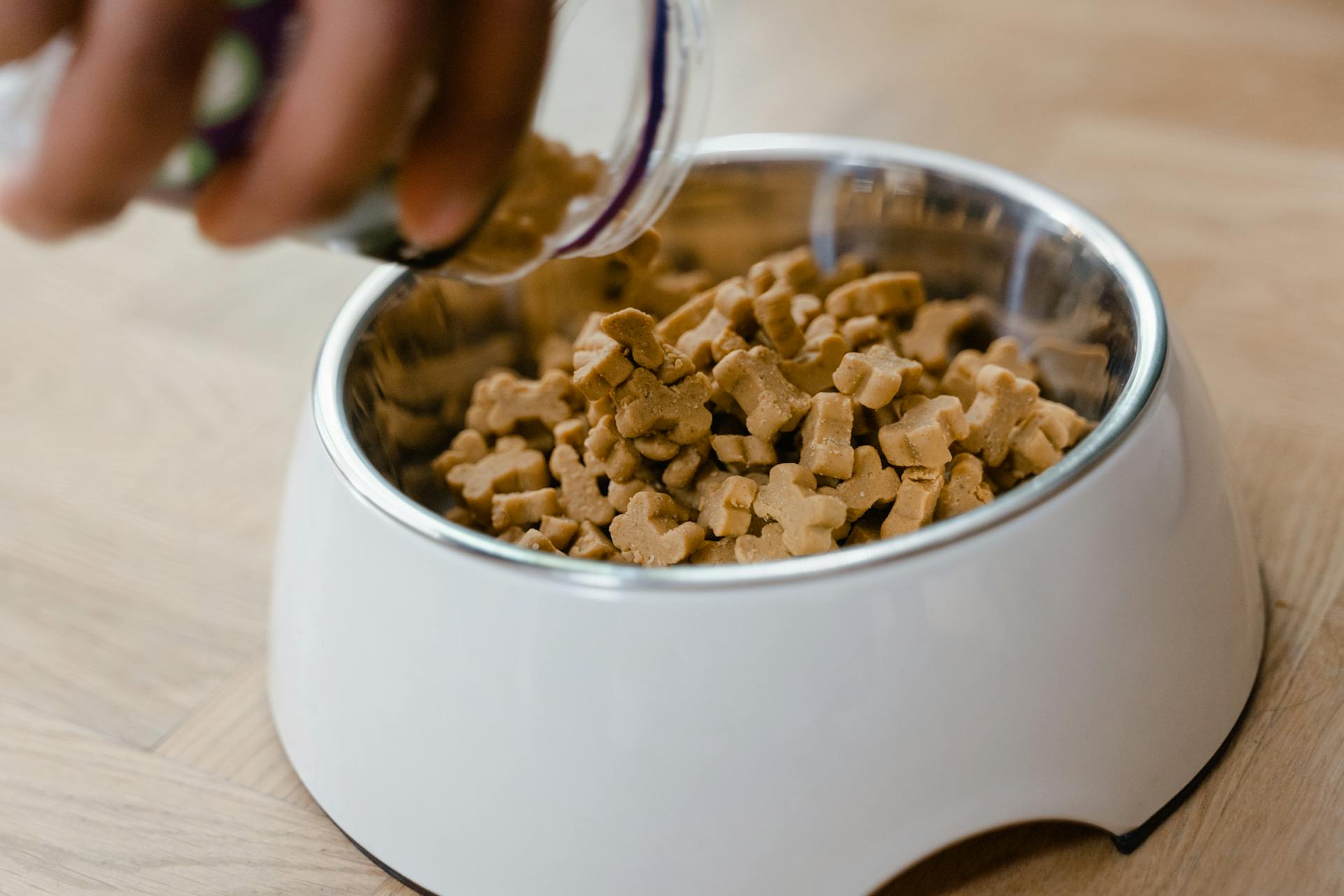
Sorbitol is a sugar substitute commonly used in dog treats to reduce the carbohydrate content. Sorbitol is a sugar-free alternative that can be beneficial for dogs with dietary restrictions.
Sorbitol is not toxic to dogs, but it can cause gastrointestinal upset in some cases. This is because sorbitol is not fully digested in the small intestine and can be fermented by bacteria in the colon, leading to gas and bloating.
Some dog owners have reported that their dogs experience diarrhea, gas, and stomach upset after consuming sorbitol-based dog treats. However, not all dogs will react this way, and the severity of the symptoms can vary depending on the individual dog.
If you're considering giving your dog sorbitol-based treats, it's essential to monitor their behavior and digestive health closely.
What is Sorbitol?
Sorbitol is a type of sugar substitute commonly used in dog treats.
It's a low-calorie sweetener derived from corn syrup, which makes it a popular choice for pet owners looking to manage their dog's weight.
Sorbitol is also known to have a lower glycemic index than sugar, meaning it doesn't cause a spike in blood sugar levels.
What Is Sorbitol Used in Dog Products
Sorbitol is commonly used in dog products as a sweetener and flavor enhancer, making it a popular ingredient in many dog treats.
Its sweet taste makes it appealing to dogs, which is why it's often used in treats that are designed to be tasty and rewarding.
In addition to treats, sorbitol is also used in toothpaste for dogs to improve the taste and encourage them to tolerate brushing.
The amounts of sorbitol used in medications are generally minimal, but it's still used as an excipient to help stabilize and deliver the active ingredients.
Here are some common dog products that may contain sorbitol:
- Treats
- Dessert biscuits
- Dog toothpaste
It's worth noting that the small amount of sorbitol in dog toothpaste is unlikely to cause issues for most dogs, unless they are overly sensitive to it.
Symptoms of Poisoning in Dogs
If your dog has consumed a significant amount of sorbitol, there are several symptoms to watch out for.
Diarrhea is a common symptom of sorbitol poisoning in dogs.
Increased thirst is another symptom to look out for, as your dog may be trying to rehydrate.
Frequent urination can also occur, as your dog's body tries to flush out the sorbitol.
Abdominal discomfort is a symptom that can make your dog feel quite miserable.
Vomiting can happen, and it's a sign that your dog's body is trying to get rid of the sorbitol.
A lack of appetite can also be a symptom, which can be concerning for your dog's overall health.
In severe cases, sorbitol poisoning can lead to dehydration.
Electrolyte imbalances can also occur, which can be a serious issue for your dog's health.
Lethargy can be a sign that your dog is severely affected by sorbitol poisoning.
Benefits and Effects
Sorbitol in dog treats can have both positive and negative effects on your furry friend. Sorbitol has fewer calories than sugar, making it a good choice for dog owners who want to control their dog's weight.
Dogs who eat foods with sorbitol may react with hypoglycemia, obesity, nervousness, cataracts, tooth decay, arthritis, and allergies. However, sorbitol can also promote dental health by preventing tooth decay.
Sorbitol has osmotic laxative properties, which means it draws water into your dog's intestines and softens the stool. This can help with constipation, but too much sorbitol can cause diarrhea and gastrointestinal discomfort.
What Are the Benefits of Sorbitol in Dog Treats
Sorbitol in dog treats is a great way to provide a sweet taste without the calories. Sorbitol has fewer calories than sugar, which can help control your dog's weight.
One of the most significant benefits of sorbitol in dog treats is its ability to promote dental health. Sorbitol does not cause tooth decay, making it an excellent ingredient for dog treats and toothpaste.
Sorbitol also has osmotic laxative properties, which can help with constipation. It draws water into your dog's intestines and softens the stool, making it easier to pass.
Here are some key benefits of sorbitol in dog treats:
- Weight control: Sorbitol has fewer calories than sugar.
- Dental health: Sorbitol does not cause tooth decay.
- Constipation relief: Sorbitol softens the stool and makes it easier to pass.
Effects in Dogs
Dogs who eat foods with sorbitol may react with hypoglycemia, obesity, nervousness, cataracts, tooth decay, arthritis, and allergies.
Sorbitol isn't completely digested in the small intestine, which can lead to sorbitol intolerance. This means it's absorbed in small amounts and then converted to fructose. The sorbitol that's left may result in diarrhea.
Dogs who eat foods with sorbitol may experience minor to moderate gastrointestinal discomfort or distress. In large amounts, sorbitol can cause symptoms like bloating, abdominal pain, gas, and nausea.
Sorbitol has osmotic laxative properties, which means it draws water into your dog's intestine for softer poop. However, too much sorbitol can cause diarrhea and other issues.
Here are some potential symptoms of sorbitol intolerance in dogs:
- Diarrhea
- Bloating
- Abdominal pain
- Gas
- Nausea
If your dog is prone to diarrhea, sorbitol can make things worse. Find out what's causing the diarrhea and if he's eating processed food with sorbitol, that's probably the first thing you need to change.
Precautions to Take
As a responsible dog owner, it's essential to be aware of the potential risks associated with sorbitol in dog treats. Sorbitol can be toxic or harmful to dogs due to reasons other than the sorbitol itself, so it's crucial to scan the ingredients of any human product before giving it to your pet.
If you're considering giving your dog a product containing sorbitol, make sure to keep it out of reach to prevent ingestion. You can also check the product label for the recommended daily dose, but remember that there's no precise indication of how much sorbitol is safe for dogs.
Some signs that your dog may have consumed too much sorbitol include bloating, excessive flatulence, vomiting, and diarrhea. If you notice any of these symptoms, it's best to eliminate the sorbitol from your dog's diet and monitor their condition.
Here are some common signs of sorbitol toxicity in dogs:
- Bloating
- Excessive flatulence
- Vomiting
- Diarrhea
If your dog experiences mild symptoms, they may resolve on their own once the sorbitol is eliminated from their diet. However, if the symptoms are severe, it's essential to seek veterinary treatment to prevent dehydration and other secondary issues.
Remember, it's always better to err on the side of caution when it comes to your dog's health. If you're unsure about the safety of a particular product or the amount of sorbitol in it, consult with your veterinarian for advice.
Management and Intake

Managing sorbitol intake in dogs requires careful attention to product labels and diet planning.
Always stick to the recommended daily dose stated on the product label, and consult with your vet if you're unsure how much sorbitol is safe for your dog.
Puppies shouldn't be given sorbitol as their bodies can't process it yet, and pregnant or nursing bitches should avoid it to prevent passing it to their puppies.
Sorbitol can cause stomach and intestinal problems, allergic reactions, and reduced nutrient absorption in dogs.
A balanced diet is essential to ensure your dog is receiving all necessary nutrients, so feed them high-quality dog food free from sorbitol and other potentially harmful additives.
Consulting with a veterinarian or professional dog nutritionist can help you create a well-balanced diet plan for your furry friend.
Sources
- https://www.dogsnaturallymagazine.com/is-sorbitol-safe-for-dogs/
- https://dogstreet.com.au/articles/the-hidden-and-harmful-additives-in-dog-treats
- https://www.greatpetcare.com/dog-nutrition/is-sorbitol-safe-for-dogs/
- https://www.fellow.dog/ingredient/sorbitol
- https://northerncascades.com/blogs/news/unveiling-the-truth-behind-sorbitol-in-dogs-how-to-safely-manage-its-effects
Featured Images: pexels.com


